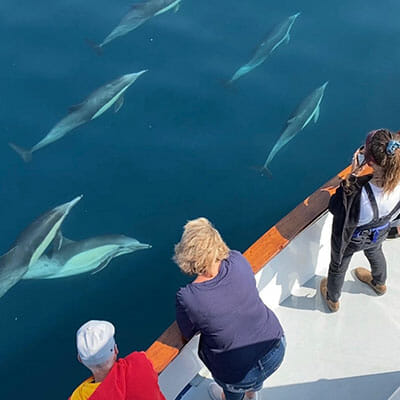Cetacean Research and Citizen Scientists
Whales are a very important topic of study among marine biologists and scientists. Research studies in whale behavior, migration, population health, echolocation, language, intelligence, environmental impact, and various other topics have helped scientists learn about the world of whales so we can continue to appreciate their ecosystem value. Here are just a few of the organizations/research projects currently going on the Santa Barbara Channel.
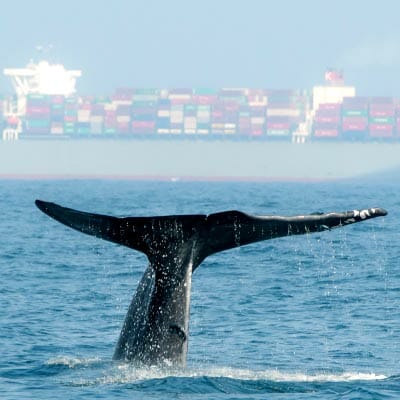
Blue Whales and Blue Skies
Every year container ships make thousands of transits through shipping lanes in Santa Barbara Channel, crossing through critical habitat for feeding endangered whales, including blues, fins, and humpbacks. Unfortunately, 2018 and 2019 were the worst years on record for fatal whale-ship collisions off the CA coast. To help protect the whales, NOAA and other agencies implemented a voluntary speed reduction program to 10 knots or less for vessels 300 gross registered tons plus while transiting through the Santa Barbara Channel. The incentives include financial awards and positive public recognition. Known as the ‘Blue Whales and Blue Skies’ program, this Vessel Speed Reduction incentive is a collaboration of government agencies, non-profits, and shipping industry stakeholders working together to reduce air pollution, ocean noise, and ship strikes on endangered whales in the Santa Barbara Channel. Learn More
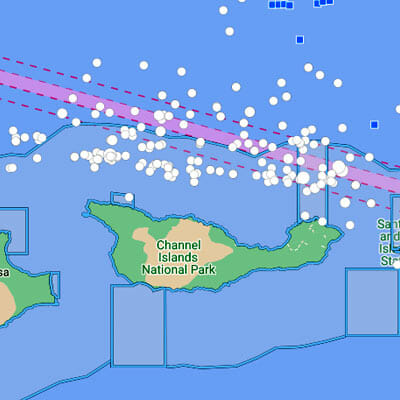
Whale Safe
Whale Safe is a technology-based mapping and analysis tool displaying whale and ship data for the Santa Barbara Channel, with the goal of helping to prevent fatal ship collisions with whales. The University of California Santa Barbara’s Benioff Ocean Initiative is working with leading whale scientists from Woods Hole Oceanographic Institution, Norwegian University of Science and Technology, the University of California Santa Cruz, University of Washington, and NOAA’s Southwest Fisheries Science Center to track whale and shipping activity to provide the best available science to reduce the risk of whale-ship collisions. Ships that slow down in important whale habitats can save whales while also reducing air pollution, greenhouse gas emissions, ocean noise and other harmful environmental impacts. Learn More
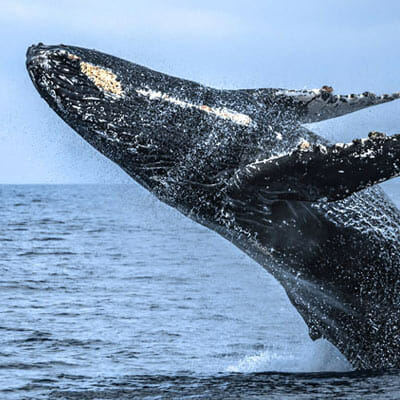
Happywhale
Happywhale’s mission is to increase global understanding and caring for marine environments through high-quality conservation science and education. We make it easy and rewarding for the public to participate in science with our powerful research and collaborative tools.
We have two simple goals: one, to help humanity better understand the world’s whales, and two, to use this understanding to better protect whales and their ocean environment.
Our approach is proving successful and we are achieving remarkable milestones in conservation and science. We created Happywhale with support from nature tourism companies. We are committed to keeping our cutting-edge technologies freely accessible, user friendly and we are on the verge of delivering so much more. Learn More
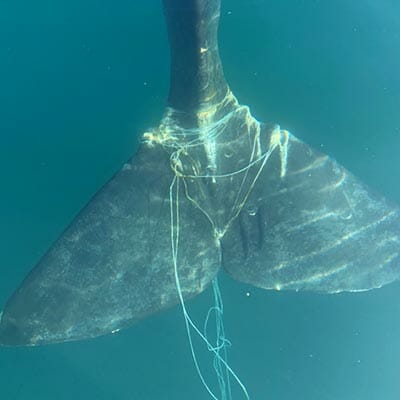
West Coast Large Whale Entanglement Response Program
Reducing the number of large whale entanglements and minimizing the likelihood of large whales becoming entangled in fishing gear promotes the conservation of healthy whale populations along the U.S. West Coast.
NOAA Fisheries is responsible for carrying out the Marine Mammal Protection Act to conserve and manage marine mammal populations and their habitat, and to coordinate responses to strandings and entanglements. The West Coast Region works in partnership with the Pacific Fishery Management Council and state fishery managers from Washington, Oregon, and California to reduce the unintentional entanglement of marine mammals in fishing operations. Learn More
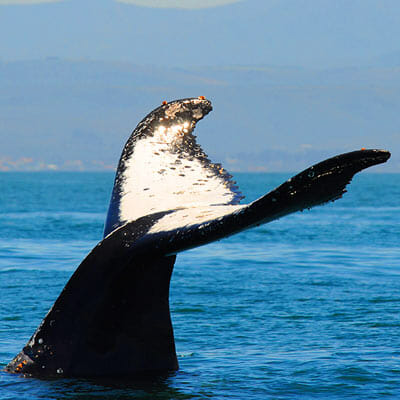
Cascadia Research’s Humpback and Blue Whale Photo-ID- US West Coast
Cascadia Research is a non-profit in Washington State and has conducted scientific research and education for the past 40 years. We have ongoing long-term research projects on humpback and blue whales both along the West Coast of the United States as well as off of Central America. We began this photo-identification research in 1986 and have continued annual surveys each year since. This photo-ID effort serves as the basis for the abundance estimates and trends for both these species off the US West Coast. Cascadia also relies on contributions from a number of opportunistic sources (including citizen science) as well as collaborators to provide sighting information and photo-IDs. Through 2018 the humpback catalog includes more than 5500 unique individuals with just over 49,000 encounters, while as of 2018 Cascadia's blue whale catalog includes over 2500 individuals with over 16,000 encounters. Learn More
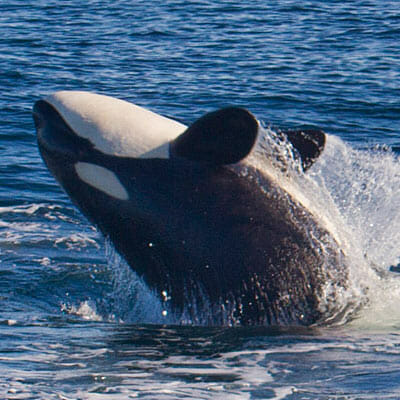
California Killer Whale Project
Our mission is to continue the long-term study of the ecology, natural history, and conservation of killer whales off the coast of California. We are a group of volunteers with a big passion for the ocean, especially orcas! We have been collecting data since 1987! It is our responsibility to continue the study and conservation of orcas and promote awareness about these incredible cetaceans. Learn More
